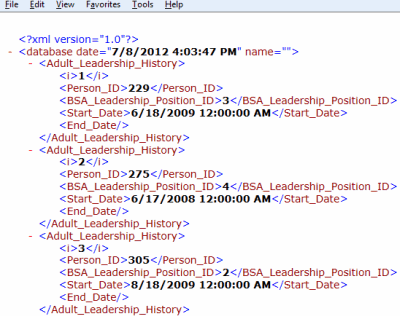The Database Backup page allows you to download a complete backup of your TroopWebHost database. It is only accessible to users with Site Administrator privileges. You can access it through Administration → Database Backup.
When you click the Continue button, your download will begin. Keep in mind that this file contains all the information in your entire database, so the download may take several minutes to complete.
 You can load this backup to a local database for ad hoc reporting.
You can load this backup to a local database for ad hoc reporting.
The backup file is in XML format, as illustrated at right. XML is an industry-standard markup language, often used to represent online data. XML is human-readable, and is convenient to use in software applications.
Depending on how much information you've entered into your TroopWebHost site, the XML file may grow too large for you to download. You may receive a "Time Out" message if this occurs. If this happens, please open a support ticket and we will be glad to copy your XML backup to a cloud storage account (like DropBox) to which you give us access.
Please note that this backup cannot be used to restore data to your TroopWebHost site. If you ever need to restore your database from a backup, we would use our internal backups, which we create on an regular, on-going basis.
TroopWebHost has two separate backup processes running in parallel.
The first process, which is managed by our hosting company, LiquidWeb, is called Acronis. It runs daily backups which are stored in an off-site location (in a different data center operated by LiquidWeb.)
The second process, which we manage ourselves, performs a full backup of every troop’s database every morning to a secondary disk drive on our database server. These backups are retained for 14 days. In addition, we run hourly incremental backups to that same drive which are retained for two days.
On request (via support ticket) we can restore your entire database to various points in time over the past two weeks. Obviously, any information entered into the system since that point in time would be lost.
Your documents and photos are stored in Microsoft Azure cloud storage, using their geographically redundant option. This means that two copies of each file are stored in each of two geographically dispersed data centers, for a total of four copies of each file. With this strategy in place we feel no need to backup these files.